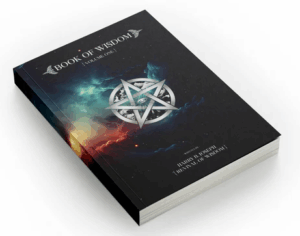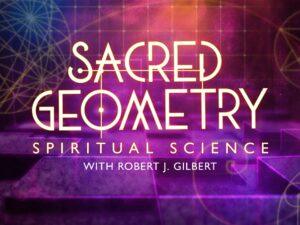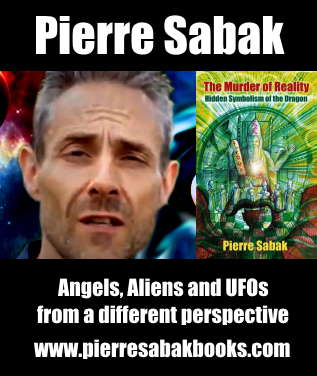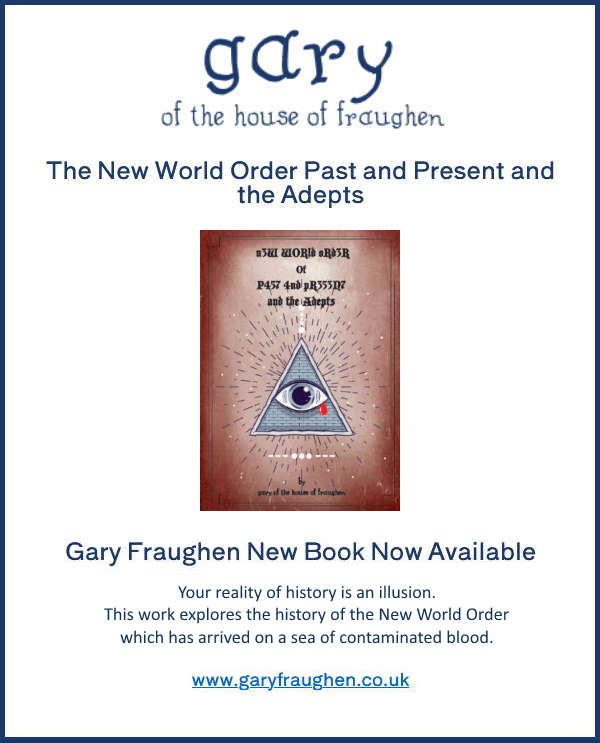What is Truth? The absurdity of materialism and fatalism on display..
Thu 3:33 pm +00:00, 14 Nov 2024Source: https://dfreality.substack.com/p/what-is-truth
“For the wisdom of this world is foolishness with God. For it is written, He taketh the wise in their own craftiness.”
— First Epistle to the Corinthians 3:19 KJV
For a worldview that prides itself on “logic” and “rationality,” there is a fatal flaw in the materialist and naturalist paradigm.
The notion that order can emerge from chaos is pure Masonic mysticism, a concept rooted in the esoteric rather than anything rational or observable. Ordo ab chao is an inversion of reason, not a manifestation of it. Consequently, materialism and naturalism make knowledge impossible, for truth cannot arise from mindless and chaotic matter. Naturalism presupposes the stability and order it denies in its rejection of the metaphysical and the divine. By affirming naturalism, one must also embrace biological determinism; which itself abolishes the possibility of genuine debate, or even the pursuit of truth.
Materialism, and its sister naturalism, rejects the immaterial a priori and posits that all that exists is matter and energy: physical substances playing out chaotically, with any perceived order merely an illusion of those very same processes. Its adherents assert that consciousness, will, and thought are merely the byproducts of our neurons firing — a cocktail of biochemistry with no higher meaning or purpose. This naturally poses an inescapable question: if thought is a phantasm of mechanistic and fatalistic impulses, by what standard can we trust it to reveal truth? If our thoughts arise from chaotic physical forces, then our conceptions of “truth” and “fact” are mere chemical accidents; and, therefore, hold no inherent value. Or, to frame it more simply, the biochemistry which caused Jeffrey Dahmer to rape and murder is no worse and no better than the impulse to stop him.
One cannot so much as affirm the existence of logic, let alone truth, in the materialist paradigm. I can not perceive the laws of logic through induction, I can not put numbers or truth under a microscope. Far from liberating mankind from “religious superstition,” the rotten fruits of the Masonic Enlightenment have done nothing but establish a philosophical and metaphysical house of horrors. Materialism annihilates the very possibility of knowledge, of truth, and of coherent or rational thought.
For all its boasts, it must steal the very metaphysics it denies while rejecting the God whose being alone can ground and justify those beliefs. Or in other words (emphasis mine):
…within the sphere of human reason alone, can we ever determine whether knowledge exists? Since everyone presupposes something, a precommitment in using logic, reason, evidence, arguments, etc., there is no one who is presuppositionally neutral when it comes to factual questions and experience. Consequently, the use of reason, logic, evidence, arguments, etc. is not something proven by experience or reason.
— Rev. Deacon Dr. Ananias Sorem, An Orthodox Theory of Knowledge: The Epistemological and Apologetic Methods of the Church Fathers
Ultimately, in the prevailing ethos of our time, there is no “true” or “false” — only this chemical response and that chemical response.
“Where is the wise? where is the scribe? where is the disputer of this world? hath not God made foolish the wisdom of this world?”
– First Epistle to the Corinthians 1:20 KJV
Yet, curiously, the naturalist can’t help but speak as if he believes in order, in laws of nature, in facts that transcend mere physicality.
Herein lies another unresolvable tension for him: the naturalist relies on the constancy and orderliness of nature, yet he cannot explain it without contradicting his own worldview. By refusing to acknowledge the immaterial, let alone a divine Creator or a universal Lawgiver, he is left with no solid foundation upon which to rest his cherished laws of nature. His laws become nothing more than descriptions, observed by chance and upheld by faith. He will readily dismiss any suggestion of divine law as “superstition,” yet expects others to believe that the cosmos has self-regulated with unwavering precision for billions of years — a tacit admission of the divine in all but name.
Thus, the naturalist must steal from the theist, borrowing the concept of laws while denying the existence of a Lawgiver. He holds to an utterly irrational faith that nature will continue to obey these illusory laws, while deriding the only worldview that can justify such faith. Christianity offers what naturalism cannot: a rational basis for believing that nature operates under the ordered principles we observe. The naturalist, meanwhile, would cling to this principle like a stowaway, enjoying the benefits of a law-governed cosmos while refusing to pay tribute to The Lawmaker.
To trust in regularity without a divine sustainer is not to eschew superstition, but to succumb to it — what the atheist might deride as “sky daddyism,” though it is he who likewise appeals to an invisible force as his safeguard. Materialism thus presupposes the very order it cannot ground. In rejecting The LOGOS, the materialist has cut himself off from the very metaphysical soil needed to support any notion of knowledge, truth, or fact. His worldview, then, is intellectually parasitic; demanding the very things it despises.
Consider the irony here: the materialist relies on his capacity for reason to argue that reason itself has no objective grounding. Then, sans any teleological or rational basis for doing so, he invites us to join him in this absurd and self-defeating belief. But how can he, without abandoning his own stated principles, call anything he says “true”?
By reducing thought to matter, he dissolves the possibility of knowledge into the same mindless atoms he worships.
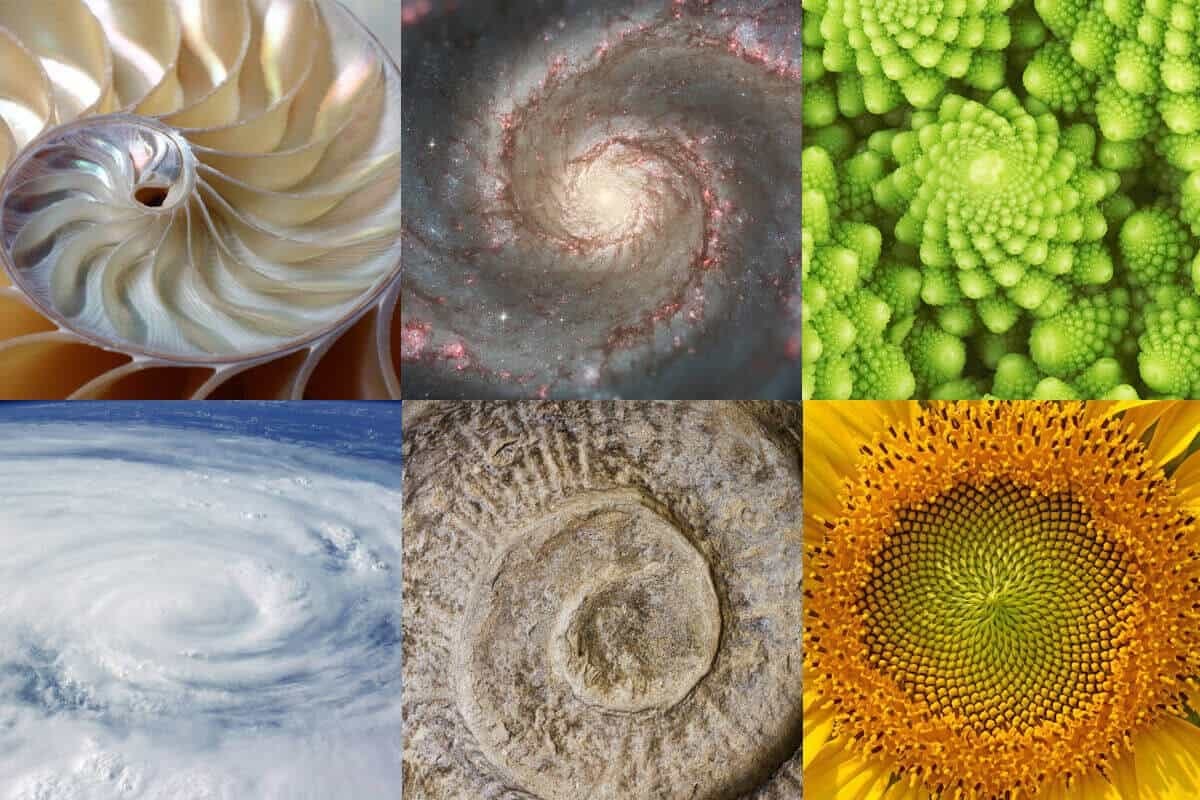
— The Fibonacci Sequence as seen in nature.
Another crucial flaw in the naturalist creed is its acceptance of biological determinism, or the idea that all human behavior, thought, and belief are governed by physical and environmental processes. If true, then the materialist must concede that every opinion he holds is merely a byproduct of these random mechanisms. Under any form of determinism or fatalism, our beliefs are not chosen or reasoned; they are mechanistically forced upon us. The atheist’s “reasoned arguments” against Christianity are thus as involuntary as the Christian’s alleged “delusions.” Truth itself becomes irrelevant, for one cannot escape the programming of one’s biology. To put it simply, if materialism is true, than the athiest has never had an actual thought in his entire life.
Thus, determinism strikes at the very heart of discourse and truth. What is the purpose of debating or seeking truth if every belief is pre-determined? The very notion of persuasion becomes patently absurd — how does one persuade random molecules? To hold that one view is “true” or “better” than another is nonsensical under a deterministic framework, for all views are but biochemical reactions occurring without purpose.
Fatalism thus entails the death of reasoned debate, for it renders all truth claims meaningless. Debate presumes that humans possess free will or rational faculties by which to weigh arguments and arrive at coherent conclusions. It presumes that we are not slaves to our biology, that there is a “self” capable of transcending mere chemical processes to assess truth: but determinism denies this possibility. If naturalism holds, then debate itself is a futile gesture, and the materialist’s crusade against Christianity collapses.
For, in denying God, he has denied and subverted any rational basis upon which to engage in the search for Truth.
“The fool hath said in his heart, There is no God.”
— Psalm 14:1a KJV
Scripture describes the atheist’s folly with an accuracy unparalleled in any philosophy text.
The atheist declares “There is no God,” yet lives his life as though God exists — pronouncing moral judgments, asserting rational principles, and claiming logical consistency that only makes sense in a theistic universe. How often do we hear the moralistic pleas of the athiest, sodomite, and abortionist; and yet, within their “moral” framework, there is no justification or rational basis upon which to determine what is actually evil or good. Their denial of God is not a reasoned position, no matter how much they may protest; it is a rebellion against the very truth revealed to them (Romans 1:19-20). Their capacity for reason and the ability to discern truth, as well as their inherent desire for it, testify against them; for these gifts are incomprehensible apart from an eternal Creator.
The grounding for truth — the anchor for all knowledge and the assurance of what is — can lay in nothing less than the mind of God. To assert otherwise, to suggest that truth either doesn’t exist or illusorily floats on the random seas of material processes, is an absurdity so glaring that even the staunchest materialist cannot functionally live by it. The atheist may mock the supernatural, he can deride the believer, but he can neither speak nor think without presupposing a framework he himself can not rationally justify. His very claim to “know” something — literally anything — depends on an immaterial, immutable standard that he does not possess and cannot explain.
Philosophically speaking, if truth were grounded solely in the material, we would be prisoners of flux. If the universe is mere matter in motion, and if thought itself is but the byproduct of random molecular interactions, then our perceptions of “truth” and “falsehood” are indeed illusions. This is the fatal flaw of materialism: it reduces thought to instinct, mind to matter, truth to opinion. But truth, if it is to mean anything, cannot be subject to the mutability of the physical world — it must be grounded in that which is above it; that which is constant, unshakable, and all-knowing.
Immanuel Kant, a Freemason and one of the seminal philosophers of the Masonic Enlightenment, laid bare this logical contradiction. He argued that if all our thoughts and sensations are merely subjective phenomena without reference to the noumenal (the realm of things as they are), then we have no access to objective reality. Knowledge becomes impossible under a purely materialist worldview, for the mind cannot comprehend anything “as it is.” Our thoughts, by this logic (as it were), are mere illusions crafted by the brain. Kant remarked:
…the transcendental conception of phenomena in space is a critical admonition, that, in general, nothing which is intuited in space is a thing in itself, and that space is not a form which belongs as a property to things; but that objects are quite unknown to us in themselves, and what we call outward objects, are nothing else but mere representations of our sensibility, whose form is space, but whose real correlate, the thing in itself, is not known by means of these representations, nor ever can be…
— The Critique of Pure Reason
That is to say, the concept or class called apple is different than you seeing an apple or from me saying the word apple. The naturalist is thus left stranded in a sea of appearances, without any anchor of objective truth or reality.
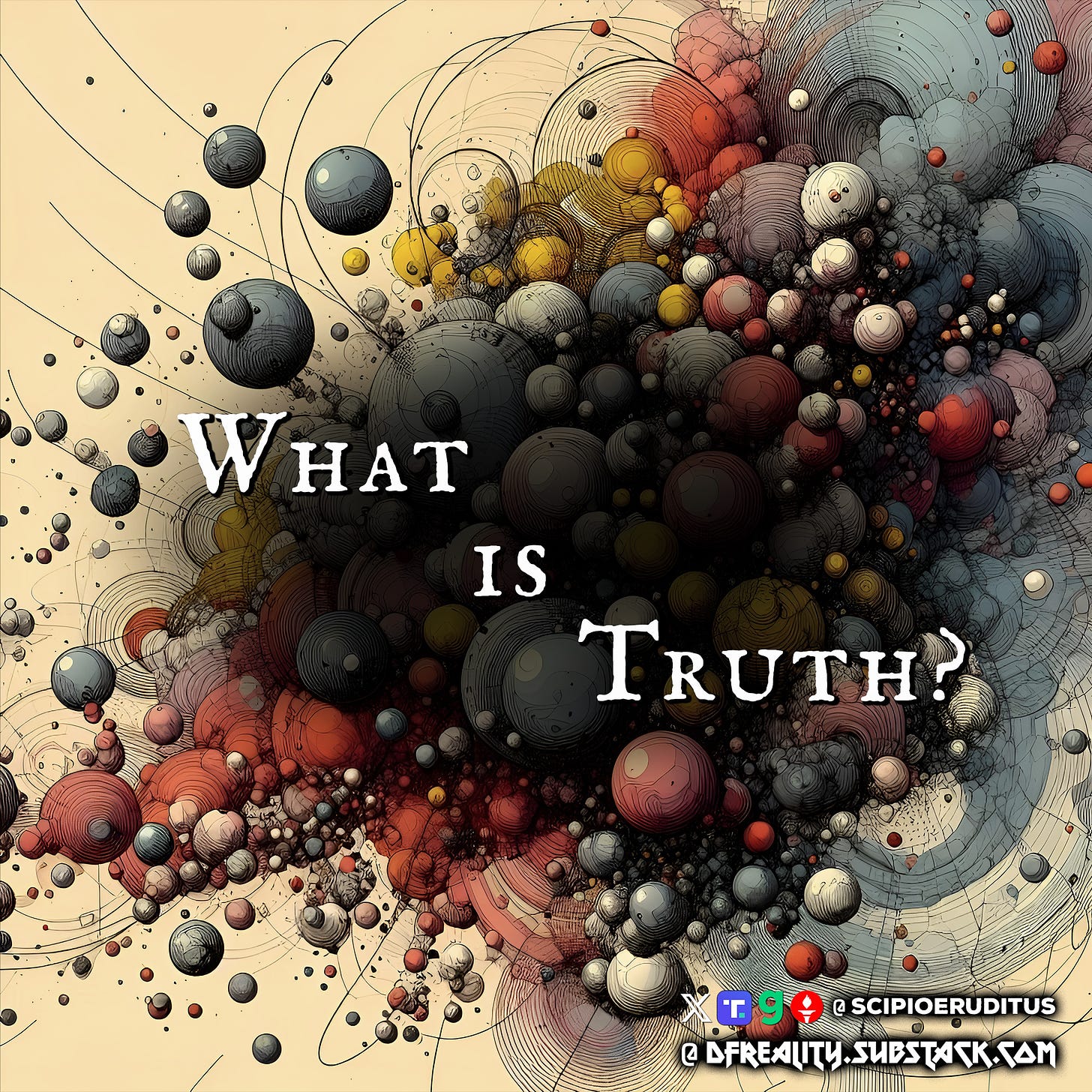
— Ordo Ab Chao, digital art, 2024.
It is for this reason that the mind of God is the only grounding for objective and unchanging truth. If truth has its origin in His nature or essence, then it is anchored in that which does not change. As the Apostle John said:
…we know that the Son of God is come, and hath given us an understanding, that we may know him that is true, and we are in him that is true, even in his Son Jesus Christ. This is the true God, and eternal life.
— The First Epistle of John 5:20 KJV
This is the cornerstone of knowledge and of life: the eternal Mind, omniscient and sovereign, one whose comprehension of reality is absolute. For God does not simply possess knowledge — He is Truth, the very measure and definition of it.
The materialist and naturalist worldview, in all its philosophical preening and bombast, is an elaborate exercise in self-deception. By attempting to explain the world without God, the atheist has plunged himself into a sea of contradictions, borrowing metaphysical principles from the theist while denying the existence of the very God who makes such principles possible. When followed to its logical conclusions, materialism is a philosophy of despair, for it destroys any hope of knowing truth, any possibility of transcending our biology.
If truth is to be meaningful in any real sense, it must be grounded in something external to us — one which is objective, unchanging, and eternal. If we are to reason, as the Scriptures implores us (Isaiah 1:18), than that not only presupposes we are capable of reason and choice, but it necessitates an absolute source of that reason. The naturalist, in denying God, has forfeited the right to make any claims to truth, for his worldview cannot support even the most basic assumptions necessary for knowledge. In the end, the materialist is left with nothing but his own self-deception — a tragic testament to the folly of those who would reject the foundation of reality (emphasis mine):
16 For by [Christ] were all things created, that are in heaven, and that are in earth, visible and invisible, whether they be thrones, or dominions, or principalities, or powers: all things were created by him, and for him:
17 And he is before all things, and by him all things consist.
– Epistle to the Colossians 1:16-17 KJV
It is only in recognizing the existence of The LOGOS — the one true God undergirding all of the cosmos — that we find the grounding for reason, the source of knowledge, and the foundation of all Truth.
Let the materialist rage; he has nothing but borrowed goods and the irrational edifice he has built for himself will inevitably crumble.
“Sanctify them through thy truth: thy word is truth.”
— The Gospel of John 17:17 KJV








